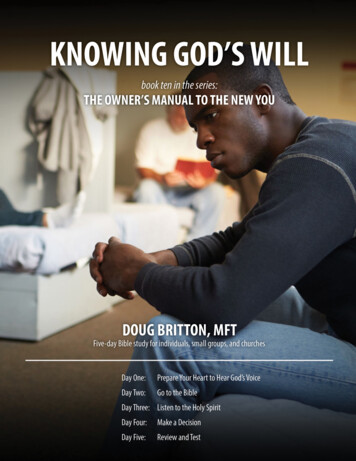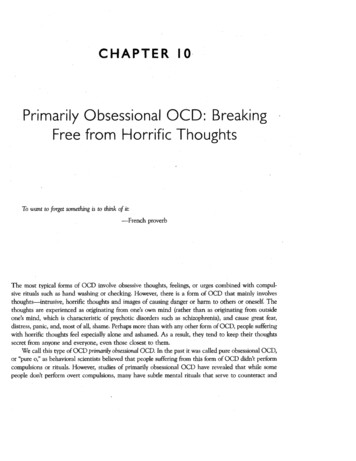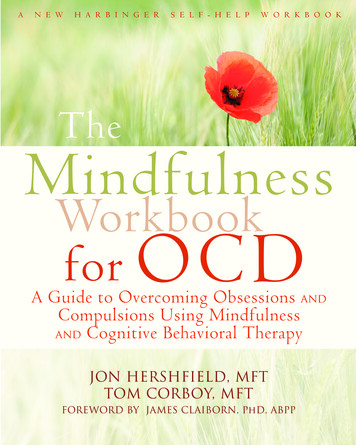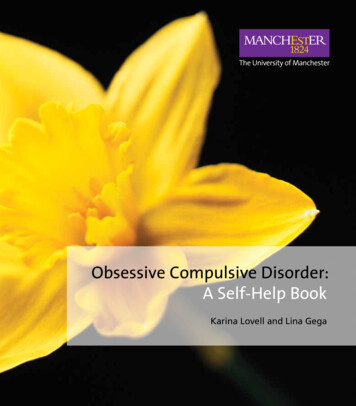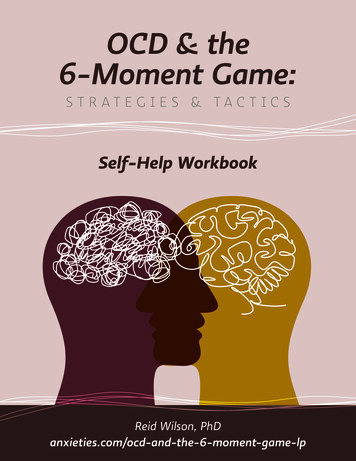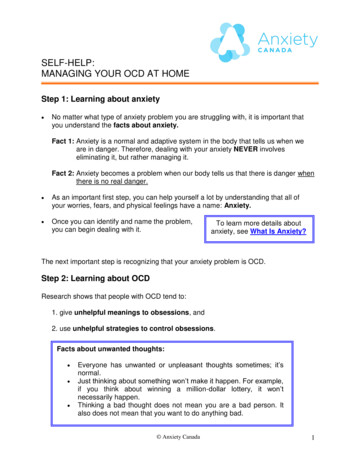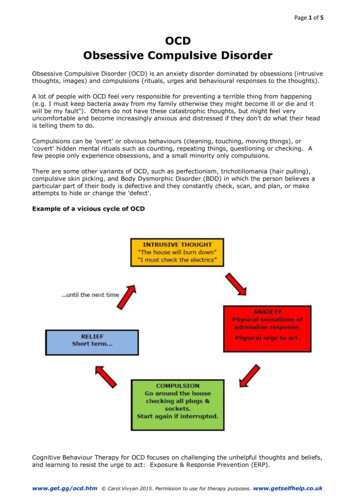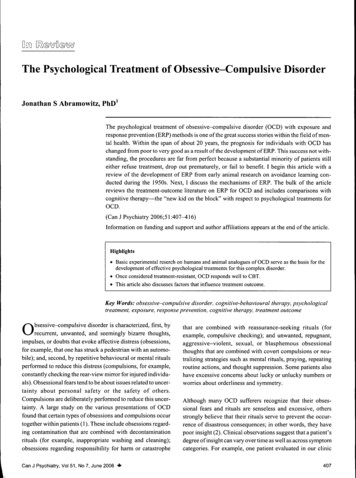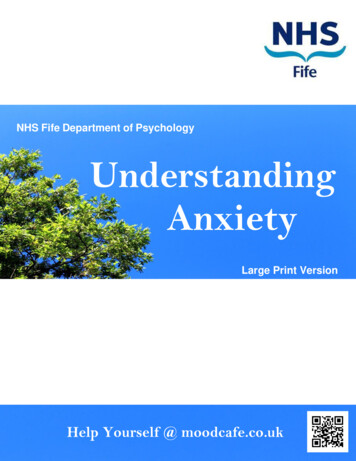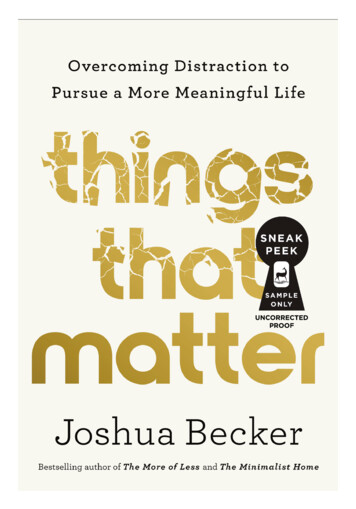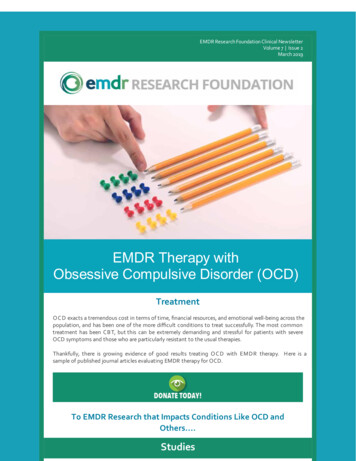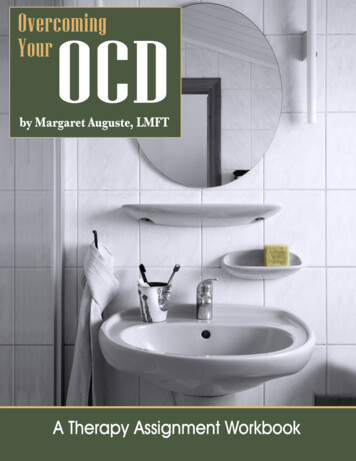
Transcription
Overcoming Your OCDA Therapy Assignment WorkbookBetween Sessions ResourcesNorwalk, CT, USA
Overcoming Your OCDA Therapy Assignment Workbookby Margaret Auguste, LMFTEditor: Karen SchaderCover and Interior Design by Mike Canavan Copyright 2018 Between Sessions ResourcesPermission is granted for the purchaser to copy these exercises for personal or professional use,but not for resale. All other rights are reserved.Disclaimer: This book is intended to be used as an adjunct to psychotherapy. If you areexperiencing serious psychological symptoms or problems in your life, you should seek the helpof an experienced mental health professional.ISBN: 978-1-947009-05-9Published byBetween Sessions Resources304 Main AvenueSuite 333Norwalk, CT 06851About the AuthorMargaret Auguste has a master's degree in Marriage and Family Therapy from PepperdineUniversity. Her eclec]c style of therapy includes mindfulness, cogni]ve, narra]ve and solu]onfocused therapy designed to emphasize the healing nature of posi]vity and one’s own personalstrengths and values. Her methodology has been shaped by her extensive work facilita]ngindividual, home-based, and group therapy with adults, children, adolescents, and families in avariety of therapeu]c environments that include psychiatric facili]es, educa]onal se ngs,adolescent group homes, and counseling centers throughout the country. She is the author ofVOYA'S Guide to Intellectual Freedom for Teens, as well as several essays and short stories thataddress psychological well-being, culture, gender, educa]on, literature, and motherhood.About the SeriesBetween Sessions Resources publishes a variety of worksheets and other tools designed to beused as therapeu]c homework. Overcoming Your OCD is one of a series of workbooks designedto help people prac]ce the psychological skills they learn in therapy.
TABLE OF CONTENTSINTRODUCTIONASSESSMENT AND EDUCATIONAssess the Role OCD Plays in Your Life1Understand What Drives Your OCD Cycle6Name Your OCD12Write Your OCD Story16Use SMART Goals to Make Smart Choices21DEVELOPING AND NURTURING YOUR INTERPERSONAL STRENGTHSCommit to Change26Create a Library of Your Values29What Would You Tell Your Friend?33Silence Your Inner Cri]c with Compassionate Reframing36Recognize and Appreciate Your Resilience41ACCEPTING AND APPRECIATING YOUR EMOTIONAL WORLDHow Do Avoidance Behaviors Impact Your World?45Face Your Fears with Acceptance and Commitment Therapy48Create a Fear Ladder53Understand That Responsibility Is Shared57Embrace the Unexpected60Transform Emo]onal Chaos into Serenity66Moderate Your Fight-or-Flight Response74Lighten Your Load Through Laughter80HARNESSING THE POWER OF YOUR MINDProbable or Possible?85Own Your Thoughts89Challenge Your Illogical Thoughts95Welcome Mindfulness into Your Life100Mindfulness and Your Five Senses105Catch and Release Your Obsessive Thoughts109Imaginal Exposure115Rescript Your Intrusive Images120
TECHNIQUES TO TRANSFORM YOUR BEHAVIORSPut the Brakes on Your Compulsions125Reschedule Your Reassurance Compulsions128Curb Your Compulsions to Diminish Your Anxiety132Help for Your OCD Handwashing135Do-It-Yourself Exposure and Response Preven]on Guide139Tools, Tricks, and Interven]ons for Your Contamina]on OCD144Change Your Procras]na]ng Behaviors149Alter Your Rituals153Embrace Your Imperfec]ons158LIVING YOUR BEST LIFEForgive Yourself for Your OCD164FOR FRIENDS AND FAMILIESHelper or Enabler?169Create a Family Contract172TOP TIPS FOR RELAPSE PREVENTION176
INTRODUCTIONObsessive-compulsive disorder impacts people of all ages and walks of life. It is defined byobsessive, uncontrollable, recurring thoughts, images, and impulses that are intrusive andunwanted, crea]ng an unrelen]ng desire to escape from the subsequent anxiety that is evoked.These overwhelming feelings ofen compel people to engage in compulsive behavior that theirOCD-driven thoughts trick them into believing will alleviate their anxiety—behavior that,paradoxically, only serves to strengthen it.This workbook will help you explore and assess the role OCD plays in your world so that you cantake back your thoughts and live the life you desire. You will gather your personal strengths,values, and passions to explore the skills you possess—skills that will further strengthen andheal you. You will stop fearing your own mind and emo]ons and begin to embrace what makesyou unique, worthwhile, and interes]ng so that you can bring serenity instead of chaos intoyour life. You will discover the healing power of your own mind and how you can train yourbrain to focus on the sights, sounds, and feelings that are all around you so that your values andgoals, instead of your OCD, will shape your thoughts and alter your behavior in a way that isconsistent with your values.Assessment and EducaAonThe first sec]on of the book, which focuses on assessment and educa]on about OCD, willenable you to develop a strategy for ar]cula]ng, planning, and reaching your goals.Although there are basic manifesta]ons common to all people with OCD, how each personexperiences it is unique. In this sec]on, you will write your own OCD story, bringing what youmight have been hiding from yourself into the light. This explora]on will allow you to discoverhow the different manifesta]ons of OCD impact you so that you can personalize your plan,which is vital to learning how to alleviate your symptoms.Developing and Nurturing Your Interpersonal StrengthsThe second sec]on will teach you just what you can accomplish with the right interpersonaltools, which include learning how to be self-compassionate, trea]ng yourself as you would afriend, and celebra]ng your resilience and inner strength by commi ng to making the changesyou would like to make.You will be encouraged to look within to rediscover, improve, and strengthen the skills, values,and personal characteris]cs that define who you are so that you can learn to appreciateyourself. This process will empower you to develop a strong founda]on within you that iscomposed of hope and faith in a bejer future where you can set goals for yourself and committo change.ki
AccepAng and AppreciaAng Your EmoAonal WorldThis sec]on focuses on the realiza]on that OCD is primarily propelled, sustained, andentrenched by your doubts and fears, which can vary from worrying that you or your familymight get hurt, or that some other unknown disaster will take place if you don’t obey thecommands you are given by your OCD-fueled obsessions. These fears limit your life and arefurther entrenched by your feelings of shame and embarrassment regarding the horriblethoughts that are a constant assault on your values and can make you view yourself in anega]ve light.You will learn to put a name to those fears so that you can separate your disorder from yourauthen]c self. Naming and accep]ng your fears will allow you to embrace rather than fear theunexpected and see your emo]ons in a posi]ve, healing light that brings serenity into your life,libera]ng you and expanding your views of yourself and the world around you.Harnessing the Power of Your MindThe fourth sec]on will focus on exploring and changing how you experience your obsessions.Those who suffer from OCD ofen report that it is par]cularly debilita]ng to feel as though theyare under constant ajack by their own thoughts. The fight to control, stop, and escape from thishorrific experience can be exhaus]ng and ofen elicits feelings of hopelessness and despair thatmake it difficult to cope with this most devasta]ng part of OCD. The techniques in this sec]oncan help you harness the healing power of your mind to explore and change the way youperceive your thoughts, allowing you to take them back from your OCD. Acceptance andcommitment therapy will allow you to accept and understand your thoughts. Medita]on andmindfulness prac]ce will quiet your mind so that you can focus on what’s important. With workand determina]on, your thoughts will uplif you, not bring you down.Techniques to Transform Your BehaviorsThe fifh sec]on will help you design a plan to conquer your compulsions. People with OCDofen report that they feel as though they are being held hostage by compulsions that causethem to lose countless hours away from their friends and family. You will learn strategies thatcan help you replace your harmful ac]ons with helpful alterna]ves.Living Your Best LifeThis sec]on will encourage you to forgive yourself for any feelings you have that lead you toblame yourself for your OCD. This forgiveness is important to restoring your emo]onal healthand sense of well-being. This sec]on will also teach you how to allow others into your life sothat you can share your hopes and fears with those you care about and no longer fight yourbajles alone.kii
Top Tips for Relapse PrevenAonIn this sec]on, you’ll commit to remembering and apprecia]ng what you have accomplishedand learned along your journey so that you can maintain all the posi]ve changes you havemade.kiii
ASSESSMENT AND EDUCATIONAssess the Role OCD Plays in Your LifeObjecAve: To determine how you are impacted by OCD by exploring your thoughts, ac]ons,and experiences.You Should KnowMany people have thoughts or see images that are upse ng or strange, but they are usuallyspontaneous, infrequent, and quickly dismissed. In contrast, OCD-fueled obsessions ofenconsist of the same mental ac]vity over at least a two-week period or more. This mentaltorment is usually accompanied by an extreme and overwhelming desire to stop or controlthese thoughts in order to alleviate the severe anxiety they provoke.Compulsions are repe]]ve ac]ons that people who suffer from OCD feel compelled to engagein to alleviate their anxiety. More ofen than not, they realize that these ac]ons areunreasonable and even harmful but are s]ll unable to stop themselves.What makes OCD so difficult to comprehend and diagnose is the various ways that obsessionsand compulsions can present themselves. Perhaps you don’t quite know how to describe whatyou are experiencing, let alone how to make it stop. This assessment can help you explore yourthoughts and ac]ons, your accompanying emo]ons, and the physical sensa]ons youexperience.Does This Sound Like You?Amy saw the same frightening images and had the same disturbing thoughts over and overagain at the most inconvenient ]mes. She found herself engaging in repe]]ve ac]ons to stopthe images and thoughts. Somewhere deep within, she realized these ac]ons were nonsensicaland even somewhat dangerous, but she felt compelled to take them. Amy did not know how todescribe what she was experiencing, let alone how to make it end.What to DoThis ac]vity will help you: recognize that the symptoms you experience are not unique to you but are universallyexperienced by others with OCD; recognize that your behaviors are symptoms of a disorder and not personal imperfec]onsthat stem solely from within you; learn what areas you could focus on to begin to manage your OCD;k1
collect informa]on that can help you to decide what steps to take next.Circle the answer that most represents how you feel. If you answer “True” to at least two of thestatements within a group of ques]ons, you are most likely experiencing symptoms thatcharacterize OCD.Obsessions1. The same thought appears in my mind repeatedly. True False2. I have obsessed over the same thought for at least a two-week period.True False3. I have thoughts and see images that are disturbing to me. True False4. I find myself trying unsuccessfully to stop or control the distressing thoughts and imagesI experience. True FalseHow many of these statements did you circle as true?Compulsions1. I feel compelled to engage in repe]]ve behaviors in response to my obsessive thoughts.True False2. My repe]]ve behaviors are all aimed at reducing the anxiety or mental distress derivedfrom my obsessions. True False3. I recognize that the compulsive acts I engage in are most likely not helpful to me, but Ifeel compelled to do them anyhow. True FalseHow many of these statements did you circle as true?ContaminaAon OCDA fear of becoming contaminated or contamina]ng someone else with germs afer coming incontact with real or imaginary unclean objects, places, or people.1. I avoid touching certain things because of possible contamina]on. True False2. I clean my living space excessively. True False3. I wash my hands excessively. True False4. I ofen take extremely long showers or baths. True False5. I am overly concerned with germs and diseases. True False6. I am afraid of going into hospitals. True Falsek2
7. I am afraid of coming in contact with people who seem to be dirty.True False8. I am afraid of certain colors that I associate with germs or dirt. True FalseHow many of these statements did you circle as true?Symmetry and Ordering OCDThe fear that nega]ve consequences will follow or that harm will come to you or those you careabout because objects are arranged or posi]oned in the wrong order and do not follow acertain pajern.1. I must have certain things around me set in a specific order. True False2. I spend a lot of ]me making sure that things are in the right place. True False3. I no]ce immediately when my things are out of place. True False4. It is important that my bedding be straightened out impeccably. True False5. I need to arrange certain things in special pajerns. True False6. When other people rearrange my things, I get extremely upset. True FalseHow many of these statements did you circle as true?Harm OCDA fear of harming yourself, a loved one, or a stranger through deliberate or thoughtless acts.1. I fear that I will blurt out inappropriate words at an inappropriate moment.True False2. I worry that I will harm someone by making careless mistakes. True False3. I worry about the fate of complete strangers. True False4. I believe I have the power to keep people from harm. True FalseHow many of these statements did you circle as true?Checking and RepeaAng OCDA fear that manifests itself in the constant feeling that something bad will happen if you don’trepeatedly check to make certain that everything is all right.1. I frequently have to check things over and over again. True False2. I have difficulty finishing tasks because I repeat ac]ons. True Falsek3
3. I ofen repeat tasks in order to prevent something bad from happening.True False4. I worry excessively about making mistakes. True FalseHow many of these statements did you circle as true?PerfecAon OCDHaving an unrealis]c and unhealthy obsession about performing tasks to a standard that isexcessively high and impossible to reach.1. I have an excessive preoccupa]on with past mistakes. True False2. I fear making new mistakes. True False3. I have constant doubts about whether I am doing something correctly.True False4. I have very high expecta]ons for myself and for others. True FalseHow many of these statements did you circle as true?Magical Thinking or Thought-AcAon Fusion OCDBelieving that simply thinking about an ac]on is equivalent to actually carrying out that ac]on.1. I believe that my thoughts can cause something to happen. True False2. I believe that thinking about an unwanted event makes it more likely the event willhappen. True False3. I believe that my thoughts are dangerous. True False4. I believe that certain numbers, colors, phrases, or ac]ons are unlucky and can causeharm. True False5. I believe that certain numbers, colors, phrases, or ac]ons are lucky and are responsiblefor good things happening. True FalseHow many of these statements did you circle as true?If you circled more statements as true than false in one or more sec]ons, you should considerthe idea that OCD symptoms play a large and impacrul role in your life.k4
ReflecAonDo you like the way your life has been going?Do you feel confused and overwhelmed by the thoughts and feelings you’ve been having?Do you want to address these thoughts but not know how to describe what you areexperiencing?Do you feel like you want and need to make a change in your life but don’t know where tobegin?FeedbackRate this exercise on a scale of 1 to 4, with 1 being the lowest and 4 being the highest.This exercise was helpful overall.1 2 3 4It helped me learn something new.1 2 3 4It helped me reach my goals.1 2 3 4k5
Understand What Drives Your OCD CycleObjecAve: To bejer recognize, understand, and manage your symptoms by becomingeducated about the OCD cycle.You Should Know The OCD cycle is made up of several components. Learning what thesecomponents are and how they work together is crucial to understanding why you feelcompelled to repeat the same unhelpful behaviors over and over again.TriggersA trigger can be anything that evokes a nega]ve or distressing reac]on within you. It can be arelentlessly intrusive thought, or a disturbing image flashing in your mind like a neon sign,warning of harm to yourself or the people you care about. It can be an object like a door handleor a fork, a place as scary as a cemetery or as innocuous as a classroom. It may not meananything to anyone but you.What makes the triggering event unique is the meaning you give to it. For example, a doorhandle might just be a door handle to someone else, but your OCD will tell you repeatedly thatthe door handle is infected with contagious germs. An empty classroom on its own may meannothing, but you might become triggered because your OCD tells you that the seats are not inthe proper order, or that there aren’t the right number of seats, or even that someone hascolored in red marker on the desk and that color means danger or blood.ObsessionsThe meaning your OCD gives to these varied triggers gives them a sense of importance andpower that turns them into obsessions, which are defined as the persistent, disturbingpreoccupa]on with an ofen-unreasonable idea or feeling that you believe must be acted on.CompulsionsThe desire to control or stop the disturbing thoughts and images you see ofen becomes sooverwhelming that you might find yourself feeling compelled to engage in ac]ons that yourOCD tells you are necessary to end the obsessions. You might find yourself washing your handsover and over, coun]ng or rearranging items, or avoiding places or people in a fu]le effort toease your anxiety.EmoAons and Physical SensaAonsThe emo]ons and physical sensa]ons that accompany your obsessions and compulsions canhelp increase the intensity of your OCD cycle, keeping it in perpetual mo]on. Exploring andunderstanding your emo]ons and physical experiences and how they impact and influence yourOCD cycle is crucial to your recovery.k6
EmoIons: Your obsessions can be further strengthened and propelled by an assault ofemo]ons—for example, fear, anger, frustra]on, or disgust—that lead to an overwhelming senseof shame, embarrassment, and hopelessness. As your obsessions generate more intensity, youstart to feel a growing, some]mes overwhelming, sense of anxiety.Physical SensaIons: The false sense that you are in danger or that those you love are in dangeris fueled by anxiety-driven bodily sensa]ons that fool you into thinking that the fear orimpending sense of doom you feel is real and imminent, and that you must do something aboutit right away.ReliefThe sense of accomplishment and sa]sfac]on you feel at repea]ng a behavior aimed at endingyour OCD as well as the overall sense of peace and relief can be intoxica]ng, deluding you intofeeling that engaging in compulsions is the answer.RepeatHowever, even if you fight to control your fears or escape from them, the roots of your fearsdon’t go away. You will recognize that this relief is only temporary, as your doubts and fears startto grow again, con]nuing the vicious cycle.Does This Sound Like You?LaShawn ofen wondered why he felt the overwhelming need to engage in compulsive acts thatdidn’t really make any sense to him. He also wondered why afer comple]ng the acts heimmediately felt such a sense of freedom, which seemed to dissipate just as quickly as it hadcome.What to DoIn this ac]vity, you’ll track your OCD cycle for a week in order to get a full picture of your uniquecycle. You’ll iden]fy the triggers, obsessions, and compulsions that make up your cycle so thatyou can clearly see the rela]onship that exists between them. Understanding the OCD cycle—what it is, how it works, and how it impacts your life—can help you bejer manage your OCDsymptoms and increase your sense of personal autonomy.Monitor Your OCD CycleMake a list of your triggers. These can be events, places, objects, numbers, colors, people or anyother triggers that are unique to your experience.k7
Make a list of your obsessions: the images or thoughts that intrusively appear in your mind.List any behavior you feel compelled to engage in order to relieve the anxiety you feel from yourobsessive thoughts.Using the checklists that follow, iden]fy the emo]ons and physical sensa]ons that exist withinyou as you are experiencing your cycle. These feelings provide the fuel that powers your OCDsymptoms, ofen serving to give those symptoms more weight than they deserve.EmoAonsPlace a check next to any of these emo]ons that overwhelm you during your obsessions or thatseem to trigger your anxiety. Use the blank lines to add others you Isola]onFearJealousyBijernessDisgustAnnoyancek8
Physical SensaAonsPlace a check next to the physical sensa]ons you experience. Use the blank lines to add others.Racing heartSwea]ngChest pain, ]ghtness, heavinessFeeling hyper and filled with energyDifficulty seeingUpset stomachFeeling dizzy and/or light-headedWeakness in major muscles,especially the legsNumbness and ]ngling in the handsand feetDry mouthLabored breathing, feeling short ofbreath, hyperven]la]onHot and cold flashesNow, track your OCD cycle for a week.OCD Tracking FormDay and sdayThursdayFridayk9PhysicalsensaAonsEmoAons
Day and moAonsSaturdaySundayReflecAonHow did exploring the rela]onships between all the various elements increase yourunderstanding of your OCD cycle?What do you think impacted your urge to engage in your compulsions the most: your emo]ons,your physical sensa]ons, or your thoughts? How will that informa]on assist you in managingyour OCD?What do you think it would look like if you could find a way to break your cycle?How do you think breaking your cycle could impact your need to engage in compulsions?What did you learn about yourself by exploring your OCD cycle?k10
FeedbackRate this exercise on a scale of 1 to 4, with 1 being the lowest and 4 being the highest.This exercise was helpful overall.1 2 3 4It helped me learn something new.1 2 3 4It helped me reach my goals.1 2 3 4k11
Name Your OCDObjecAve: To visualize your problem as a separate external en]ty rather than internalizing itas a problem that defines you.You Should KnowNarra]ve therapy is commijed to externalizing your problems instead of internalizing them byhelping you recognize that you are not your problem. This type of therapy allows you torecognize, appreciate, and focus on your resilience and sense of self-worth—assets that haveallowed you to survive and thrive as best you can under condi]ons that are difficult to navigate.It inspires you to come from a place of strength that is within you, drawing upon your hopes,dreams, skills, and values to guide you through a difficult ]me.Naming the problem is a technique developed within narra]ve therapy. The emphasis placed onhow you speak about your rela]onship to a problem is key to your ability to feel posi]ve andhopeful. For example, when you say to yourself, “I am depressed” or “I am an angry person,”you recognize the emo]onal punch that is detrimental to you instead of being life affirming.This recogni]on allows you to fully separate yourself from a problem, rather than definingyourself as the problem, thus preven]ng the problem from strengthening the troublesomenarra]ve you use to describe your life.Does This Sound Like You?Maria ofen described herself as a flawed person who was obsessed, compulsive, and unable tocope with the world around her. She wanted something bejer for herself but believed stronglythat her problems were so incapacita]ng that there was not much hope in making any las]ngchanges in her life.What to DoNaming your OCD will allow you to see yourself as a whole person with many facets, instead ofviewing yourself through the nega]ve lens of your OCD. Crea]ng this separate iden]ty willallow you to accept and own the role the problem takes in your life; voice your problem using language in a way that transforms it into a singular thing that ismanageable and not overwhelming; objec]vely examine your rela]onship to your problem so that you decide for yourselfwhat role you would like it to play in your life; be angry at or cri]cal of the problem instead of yourself as an individual;k12
transform the problem into an en]ty that can be visualized and understood.Follow these steps to create a name for your problem:1. Think of how you visually see the problem unfolding.2. Think of the emo]ons the problem evokes.3. Think of how you would physically describe the problem.4. Write a sentence or two describing how you experience the problem.Choose from these examples or make up your own unique name.AngerVolcano: I am angry like a volcano building slowly and erup]ng, hur]ng and burning everyone inits path.Cobra: My anger is like a cobra. I feel it quickly, and it strikes without warning.Lightning rod: My anger rises quickly and is bright like a lightning strike, and then just as quicklyit is over and I regret it.DepressionBlanket: It feels comfortable and safe at first, like a familiar blanket, but eventually it feelssmothering and heavy, holding me down, holding me back.OCDJailer or warden: It keeps me cap]ve and forces me to do its bidding.Prison: I am trapped in a place I can’t get out of.Monster or bully: My OCD is like an evil being in a nightmare that chases me and always catchesme.ObsessionFly: My obsessions are like flies constantly bothering me.Bee: My obsessions are like bees constantly buzzing in my ear.CompulsionHamster: My compulsions are nonstop, like a hamster on a treadmill.Boulder: Some]mes I am unable to stop myself from engaging in my compulsions. When theystart, the pressure becomes too great to resist, like a boulder rolling down a hill.k13
Using the space that follows, create a name for your problem and describe how it affects you.You can think of one name for your OCD or separate names for your obsessions and yourcompulsions if you prefer. Feel free to color your crea]on or decorate it in any way you wouldlike.ReflecAonHow did it feel to visualize your problem on paper instead of allowing it to dominate yourthoughts?How did it feel to separate your problem from yourself instead of internalizing it?k14
Was it easy or difficult to think of a name for your problem? What emo]ons did the processevoke for you?FeedbackRate this exercise on a scale of 1 to 4, with 1 being the lowest and 4 being the highest.This exercise was helpful overall.1 2 3 4It helped me learn something new.1 2 3 4It helped me reach my goals.1 2 3 4k15
Write Your OCD StoryObjecAve: To explore your thoughts and feelings about the role OCD has played in your life bycrea]ng an OCD narra]ve.You Should KnowPeople with OCD ofen spend years struggling to understand and define an illness that is hard topin down, hard to diagnose, and even more difficult to address because their dominantnarra]ve is one of problems, limits, and hopelessness.Narra]ve therapy uses the power of storytelling to transform the ofen nega]ve and narrowstories your OCD encourages you to tell about yourself into an alternate story that reflects amore posi]ve framework which takes into account a wide array of experiences and emo]ons.Telling your story is a great way to begin the momentous task of libera]ng yourself from yourOCD. It takes bravery and perseverance to examine both the posi]ve and nega]ve aspects ofwhat makes you a whole person with honesty and integrity. Afer years of doing everythingpossible to avoid facing what you fear the most, it may seem almost impossible, but thebenefits of slowly taking stock of your life instead of mindlessly rushing from one thing toanother, of taking the ]me to organize your thoughts and feelings, can help you grow personallyand emo]onally so that you can more clearly see your future.Does This Sound Like You?Patrick found himself inundated with his obsessive thoughts, which had been part of his life forso long that couldn’t really remember a ]me when he had ever been free of them. Even whenhe was with family and friends, Patrick ofen found himself feeling alone with only his disturbingthoughts for company.What to DoCrea]ng your own OCD story can help you recognize and understand the role OCD has played inyour life, enabling you to establish or reestablish your iden]ty and shape your purpose in theworld. Remember that, especially when you are describing your rela]onship with OCD, thestories that you tell about yourself are not stagnant but are, in fact, just the opposite. They areevolving, with mul]ple endings and possibili]es.Use the following story map ques]ons to create your story. Whether you use the name youcreated for OCD in the preceding ac]vity or simply call it “OCD,” refer to it as if it were aseparate en]ty from you. Write your story in the first person; for example:
A Therapy Assignment Workbook Between Sessions Resources Norwalk, CT, USA. . Her eclec]c style of therapy includes mindfulness, cogni]ve, narra]ve and solu]on-focused therapy designed to emphasize the healing nature of posi]vity and one's own personal strengths and values. Her methodology has been shaped by her extensive work facilita]ng
